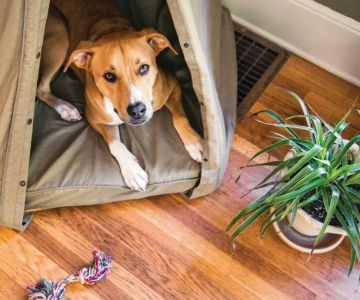
How to Handle Pet Jealousy When You Have More Than One
- Understanding Pet Jealousy
- Signs of Pet Jealousy
- How to Manage Pet Jealousy
- Real-life Case: Overcoming Pet Jealousy
- Helpful Tips for Managing Multiple Pets
If you have more than one pet, you’ve probably noticed moments when one seems to demand more attention or act out when you’re paying attention to another. This behavior is commonly known as pet jealousy, and just like humans, pets can experience feelings of competition and insecurity. Understanding why this happens and how to address it is crucial for maintaining harmony in a multi-pet household.

Veterinary Acupuncture and Alternative Medicine in Phoenix
20616 N Cave Creek Rd #112A, Phoenix, AZ 85024, USA
Signs of Pet Jealousy
Pet jealousy can manifest in several ways. Some common signs to look for include:
1. Attention-Seeking Behavior – One pet may try to push its way into the spotlight when you’re interacting with another, jumping on your lap, barking, or whining for attention.
2. Increased Aggression – Jealous pets may become more territorial, showing aggression toward the other pet or even you. This could include growling, snapping, or resource guarding (like toys, beds, or food).
3. Change in Behavior – A pet that’s typically calm may start exhibiting destructive behavior, such as chewing furniture or urinating indoors. This could be a sign of frustration or anxiety stemming from jealousy.
4. Withdrawing – Some pets may respond to jealousy by withdrawing, becoming less playful or hiding in corners when the other pet gets attention.

Veterinary Specialist Partners & Urgent Care (VSP)
LouisvilleJefferson CountyKentucky
11600 Main St, Louisville, KY 40243, USA
How to Manage Pet Jealousy
Managing jealousy between pets requires patience and understanding. Here are several strategies you can use to help reduce these feelings and foster a more peaceful home:
1. Equal Attention – One of the best ways to prevent jealousy is to ensure that each pet receives equal amounts of attention. This doesn’t mean dividing time equally, but making sure each pet feels loved and valued in their own way.
2. Positive Reinforcement – Reward good behavior with treats or praise. If your pet is showing calm behavior around the other animal, reinforce this by rewarding them, helping them associate good things with calmness and cooperation.
3. Separate Time – Give each pet individual time with you. Whether it’s taking one pet for a walk while the other stays home, or simply sitting with one pet while the other rests, these moments of undivided attention can help alleviate jealousy.
4. Manage Resources – Jealousy often arises when pets feel they need to compete for food, toys, or your attention. Make sure each pet has their own space, toys, and food dishes to minimize the potential for conflict.
5. Gradual Introductions – If you're introducing a new pet to your household, take it slow. Gradual introductions can help reduce tension and prevent jealousy from building. Keep the new pet in a separate space at first and gradually allow them to interact.
Real-life Case: Overcoming Pet Jealousy
Sarah, a pet owner from Ohio, adopted a second dog after her first dog, Max, had been the center of attention for several years. Initially, Max seemed to welcome his new sibling, but over time, Sarah noticed Max becoming more possessive of his toys and attention. He would bark excessively when she tried to pet the new dog or became more aggressive during playtime.
After researching pet jealousy, Sarah took action by implementing a routine of equal attention. She would take Max for walks separately and give him one-on-one time for training and affection. She also began using positive reinforcement to reward calm behavior and made sure both dogs had their own space and toys. Within a few weeks, Max's jealous behavior decreased, and both dogs were able to enjoy each other’s company without conflict.
Helpful Tips for Managing Multiple Pets
If you're living in a multi-pet household, here are some additional tips to help keep the peace:
1. Consistency is Key – Be consistent in how you treat each pet. If one gets a treat for good behavior, the other should get one as well. Consistency will help them feel secure and reduce competition.
2. Provide Plenty of Mental and Physical Stimulation – Bored pets are more likely to act out. Ensure your pets are getting enough exercise, mental challenges, and playtime. A tired pet is less likely to be jealous.
3. Consider Professional Training – If the jealousy becomes unmanageable or leads to aggressive behavior, seeking professional help from a trainer can provide solutions tailored to your pets' specific needs.
Managing pet jealousy takes time, but with the right strategies, your pets can learn to coexist peacefully. Remember, the goal is to create a harmonious environment where each pet feels loved and secure. For additional support and products to help you manage multiple pets, visit Pet & Puppy for a range of pet supplies that can make your home more comfortable for everyone.







 Princeton Veterinary Hospital4.0 (821 reviews)
Princeton Veterinary Hospital4.0 (821 reviews) Thomas Ridge Kennels4.0 (17 reviews)
Thomas Ridge Kennels4.0 (17 reviews) All Creatures Animal Hospital4.0 (354 reviews)
All Creatures Animal Hospital4.0 (354 reviews) Fatty Paws Pet Boutique0.0 (0 reviews)
Fatty Paws Pet Boutique0.0 (0 reviews) CityVet | Lone Mountain Veterinary & Urgent Care4.0 (104 reviews)
CityVet | Lone Mountain Veterinary & Urgent Care4.0 (104 reviews) Petnificent Picks5.0 (1 reviews)
Petnificent Picks5.0 (1 reviews) How to Transition a Senior Pet to Easier-to-Eat Food: A Comprehensive Guide
How to Transition a Senior Pet to Easier-to-Eat Food: A Comprehensive Guide The Hidden Dangers in Common Pet Supplies: What You Need to Know
The Hidden Dangers in Common Pet Supplies: What You Need to Know Managing Chronic Conditions in Pets: Essential Diet, Medication & Lifestyle Tips
Managing Chronic Conditions in Pets: Essential Diet, Medication & Lifestyle Tips How to Build a Pet Emergency Kit: Essentials You Need
How to Build a Pet Emergency Kit: Essentials You Need Best Practices for Pet Grooming Frequency by Breed: Keeping Your Pet’s Coat Healthy
Best Practices for Pet Grooming Frequency by Breed: Keeping Your Pet’s Coat Healthy The Effect of Seasonal Allergies on Pets & How to Help
The Effect of Seasonal Allergies on Pets & How to Help